Dentures – San Juan Capistrano, CA
Durable & Natural-Looking Restorations for Your Smile

Dentures are one of the most effective restoration treatments for renewing missing teeth. Although they have a long track record and have been popular for decades, modern dentistry has made them even more durable and lifelike than ever before. For this reason, they continue to be one of the top tooth-replacement options out there. If you’re struggling with tooth loss, feel free to speak with our team at Platinum Dental Group of San Juan Capistrano about dentures in San Juan Capistrano. Read on or give us a call today to schedule your initial consultation!
Why Choose Platinum Dental Group of San Juan Capistrano for Dentures?
- Durable & Natural-Looking Restorations
- Professional, Dedicated & Caring Dental Staff
- Accepts Dental Insurance & Alternative Financing Options
Who’s a Good Candidate for Dentures?

Are you struggling with moderate to extensive tooth loss? If so, then you’re likely a good candidate for dentures. This tooth-replacement option is specifically designed to renew your smile, speech, and bite, which will drastically improve your quality of life. Even if you have any developing issues in your smile, such as gum disease or an infected tooth, you can undergo preliminary treatments to get you back on track with good oral health to prepare you for your future dentures.
Effects of Missing Teeth
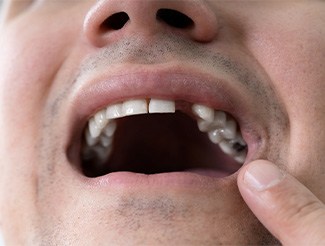
Tooth loss can have an extreme impact on your well-being. According to the American Academy of Periodontology, there are many negative consequences of missing teeth. They include facial sagging, difficulty speaking, challenges while eating, and low self-esteem. By replacing your missing teeth with dentures, you can better all of these areas, drastically improving your quality of life.
What Qualifies You for Dentures?

Dentures are an excellent solution for people who are missing multiple teeth. Depending on the number of teeth you’ve lost and their locations in your mouth, we can put together a customized treatment plan to meet your needs. The main qualification you must meet is being in good oral health. Any existing issues, like tooth decay and gum disease, need to be addressed and eliminated ahead of time. Once your existing teeth and gums are in good health, we can move forward with the rest of the denture process.
Alternative Tooth-Replacement Options
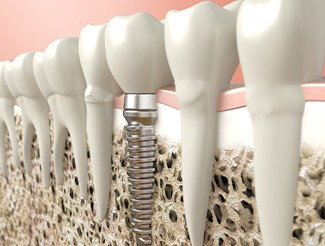
If dentures don’t sound like your thing, there are other solutions out there to address tooth loss. Here’s what we offer:
- Dental Bridge: A dental bridge works by “bridging” the gap in your smile with a replacement tooth. The replacement tooth, also called a “pontic,” is supported by two dental crowns that are placed on the adjacent teeth.
- Dental Implants: A dental implant is a titanium, screw-like post that is surgically inserted into the jawbone to support a replacement tooth. This requires that you have a sufficient jawbone. Dental implants have a higher upfront cost, but they are made to last for many decades.
Types of Dentures

By replacing missing teeth with dentures, you can effectively restore your ability to chew comfortably, talk clearly, and smile confidently. To achieve this, every patient’s restoration will be custom-designed to address their unique dental needs. Here are three common types of dentures you can choose from:
Partial Dentures

As the name suggests, these dentures are made to address partial tooth loss. If you have some or most of your remaining natural teeth intact, this may be the ideal option for restoring your smile. This dental appliance consists of a series of metal frameworks beneath a gum-colored base that fastens to your remaining permanent teeth. This allows your natural-looking prosthetic teeth to blend seamlessly to fill the gaps, providing you with a reliable and beautiful smile.
Full Dentures

Do you have an entire arch of missing teeth? Full dentures will be the best solution for your dental needs. While this appliance also has a gum-colored base, your replacement teeth will be secured via natural suction to the gums, denture adhesive, or a combination of the two. Your prosthetic teeth will effectively restore your smile and your capacity to chew and speak comfortably.
Implant Dentures

If you want a more comprehensive and lifelike solution for rebuilding your smile, then dental implants are the state-of-the-art treatment you’ve been looking for. By first inserting titanium posts into your jawbone, we’ll be able to secure your dentures directly to them. Since the metal posts will serve as your new permanent roots, you won’t have to worry about keeping your restorations in place with your gums, denture adhesive, or other healthy teeth. With proper care, you can expect to enjoy your implant dentures for several decades before needing to replace them.
How Dentures Are Made
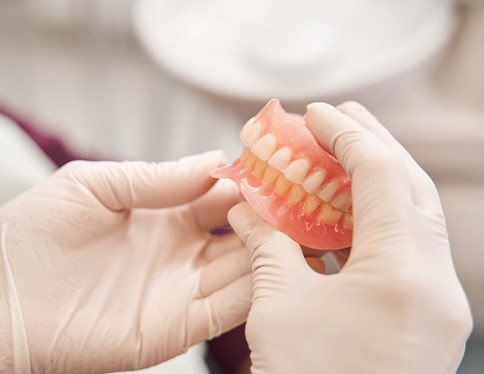
Dentures are a versatile solution that can replace some or all your missing teeth, and many patients want to know how. The key to their functionality is their customized design tailored to your unique needs. Our team believes that understanding the process behind their design and creation can help you better understand and appreciate your recently enhanced smile that much more.
Continue reading to learn more about how dentures are made, and feel free to contact us for additional information.
What are Dentures Made Of?
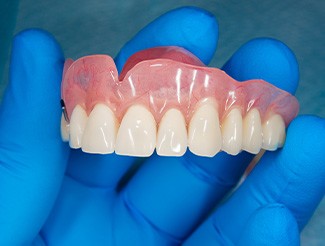
Your dentures consist of two main parts: the base and the artificial teeth, or pontics. Each section is described in more detail below:
- Denture Base. This is the foundation that gives your restoration its structure. It can be made from different substances, such as nylon, porcelain, resin, or metal. The standard choice is acrylic because this material can be carved and colored to look just like your natural teeth. Partial dentures typically include metallic clasps that clip to healthy teeth in your mouth to remain in place.
- Pontics. The teeth of your dentures are usually carved from durable resin or porcelain because they reflect light similarly to enamel. Ceramic tends to be the default option because of its resilience, but it can be abrasive against natural teeth, so it is often recommended for full dentures rather than partial.
The Denture Creation Process
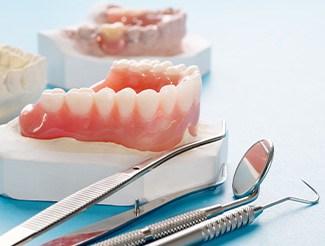
Although it might vary slightly based on your unique circumstances, the step-by-step process of creating your prosthetics includes:
Step 1: Our team uses advanced technology to create digital impressions of your teeth, gums, and jaw. These will be sent to a special dental laboratory that uses them to create your dentures.
Step 2: The laboratory uses the impressions to mill the physical model with 3D printing or computer numerical control (CNC). A wax version of your gumline is placed on the model.
Step 3: Pontics will be set into place with a mechanical device called an articulator. Then, a technician shapes and carves the wax to look as lifelike as possible.
Step 4: The wax dentures are sent to our team so we can schedule you for a fitting. If everything checks out, we’ll send them back to be finalized.
Step 5: Back at the lab, your prosthetics are placed in a flask filled with plaster to maintain their shape. Then, this container is put into hot water to melt the wax portions away.
Step 6: Holes are made into the artificial teeth, and a liquid separator is added to the plaster to ensure that the acrylic won’t stick. Then, acrylic is injected into the flask to replace the wax.
Step 7: The plaster is carefully removed to reveal the dentures inside. These are then placed into an ultrasonic bath to wash them thoroughly.
Step 8: Any excess material will be trimmed away, and the teeth will be polished to perfection.
Step 9: Once we receive your completed teeth, we’ll schedule you for a final fitting before sending you home with a restored smile!
Adjusting to Your New Dentures

Once your dentures are in place, you might be eager to start eating and speaking like you did before any teeth went missing. However, most patients need some time to adjust to wearing them before they can resume normal activities. It can often take about a month for your tongue and other supporting muscles to relearn basic tasks with them in place, like enunciating words and grinding food.
You can ease the transition by starting with soft foods until your gums have become desensitized and can handle more solid options. Also, it can benefit your speech patterns to practice speaking slowly at home, where you won’t feel judged for a slight lisp or other temporary issues.
The Benefits of Dentures

Losing any number of teeth can affect the way you eat and speak, and it can have a negative impact on your confidence. By that same token, however, filling in the empty space with personalized dentures can make a significant difference in your overall quality of life. If you’re still trying to decide whether you should get dentures to revitalize your smile, take the time to learn more about the benefits they can provide.
Psychological Benefits

One of the less obvious effects of tooth loss is the impact it can have on your mind. Many people with missing teeth are prone to feelings of sadness and depression; they also tend to be more anxious in social situations. Re-completing your smile with dentures can help you feel a lot better about yourself; you’ll no longer have to worry about undue attention being drawn to the gaps in your grin. Additionally, you’re likely to be more confident when it comes to interacting with others in social situations.
Clearer Enunciation

Trying to speak without a full set of teeth can be tricky. Some words may be particularly hard to pronounce due to the way the lips and tongue need to move to create certain sounds. Luckily, dentures can help solve this problem by making it easier to speak clearly and fluently. It may take some practice to get fully used to speaking with your new prosthesis, but after that, you shouldn’t have any problems communicating with others in a way that lets you be clearly understood.
Improves Nutrition

Obviously, getting proper nutrition is essential for maintaining a healthy body. However, without a full set of teeth, there are many foods that you will likely need to avoid. Furthermore, you won’t be able to chew your food as well, which can lead to digestive issues. Dentures improve your chewing capabilities, letting you enjoy a significantly more varied diet and making it far easier to get the nutrients that you need.
Preserves Oral Health

Tooth loss can have a highly negative impact on the rest of your smile. Any remaining teeth may start to drift out of place due to the empty space, and they’ll be exposed to more of the pressures of chewing, causing them to wear down faster than normal. However, if you get a partial denture to replace your missing teeth, you can avoid these types of issues and protect the overall health of your smile.
Expands Opportunities

As you’re no doubt already aware, a great smile can go a long way toward making an excellent first impression at job interviews and various other important events. If you want your grin to look its best when it counts the most, you will want to have any missing teeth replaced as soon as possible. Revitalizing your smile with dentures could ultimately help give your career and your social life a boost.
Understanding the Cost of Dentures

If you’re on the fence about getting dentures to restore your smile, you might have questions about the overall cost of treatment. Our team is happy to work closely with you so that you fully understand what you’ll pay and can lower your out-of-pocket expenses whenever possible. Keep reading to learn a little more about what factors influence the cost of dentures and how you can affordably rebuild your smile!
Factors That Affect the Cost of Dentures

We won’t be able to give you an exact cost estimate for your restoration until you visit us for a consultation, since dentures are fully customized to fit your unique smile. That said, the cost of dentures is usually affected by a few different factors, including:
- The severity of your tooth loss.
- The materials (such as the type of acrylic used for the base) your restorations are constructed from.
- Any necessary preliminary dental treatments such as periodontal therapy or tooth extractions.
Are Implant Dentures More Expensive?

Implant dentures are typically more expensive than traditional ones; however, they’re well worth the higher price. Implant dentures are different from standard ones in that they’re surgically embedded into your jawbone with the assistance of dental implants. Not only do these implants secure your dentures, but they also provide various oral health benefits including jawbone stimulation and facial support! And since they can last for several decades with proper care, they’re also incredibly cost-effective.
Does Dental Insurance Cover Dentures?

Dentures are often deemed as essential for restoring and preserving your oral health, meaning that many insurance providers can cover at least a portion of the cost (usually around 50%). Since the details of every insurance plan differ, it’s always wise to check with your provider before committing to treatment so that there aren’t any surprises when it’s time to pay the bill. Our knowledgeable team would be happy to help you navigate the details of your plan to ensure that you’re taking full advantage of your benefits!
Other Options for Making Dentures Affordable

Even if you don’t have dental insurance benefits, you aren’t out of luck; there are other means of making dentures more affordable! We’re happy to offer financing through CareCredit and Lending Club that’ll allow you to break up your cost of treatment into flexible installments. You can also enroll in our in-house membership plan. Don’t hesitate to contact our team today so that we can discuss your options and figure out the financial aspects of restoring your smile.
Denture FAQs

Dentures in San Juan Capistrano have been used for generations to rebuild beautiful smiles for patients with significant tooth loss. Although they are a tried and proven solution, they are a big investment, and it's normal to have a few concerns. Dr. Omrani will explain everything during your consultation to ensure you're confident in the decision you're making for your smile and quality of life. While you wait for your appointment, here are the answers to the most frequently asked questions about dentures.
Does an Upper Denture Always Cover the Palate?
Patients often have concerns about diminished food taste when using an upper denture that covers the roof of the mouth. Not to mention, some people worry it will be uncomfortable or bothersome. Thankfully, there are many types of dentures to choose from, including those that don't cover the palate. Your dentist in San Juan Capistrano will learn more about your preferences and review all of your options to find the perfect denture for your needs, like one with a horseshoe shape.
Can I Sleep With My Dentures?
You'll be instructed to wear your dentures for 24 hours after receiving them, including at night. After the first day, establish the habit of removing them before going to bed. Although no one wants to get caught without their teeth, dentures restrict blood circulation to your gums. If the soft tissues aren't given time to recuperate, they can become sore and inflamed. Not to mention, your mouth is a perfect breeding ground for harmful oral bacteria that can affect the lifespan of your dentures and compromise your general health. Taking your dentures out before calling it a night gives your gums a break. It also allows you to clean your mouth and dentures to remove any harmful bacteria to safeguard your investment and overall wellness.
Do I Use Regular Toothpaste to Clean My Dentures?
While your dentures will look like your real teeth, they can't be cleaned the same way. Some toothpaste is abrasive, which can scratch your dentures. Food particles and plaque can get trapped in the small crevices, tarnishing their appearance and leading to unpleasant odors. Instead, it's best to use a soft-bristled toothbrush and anti-bacterial hand soap or dishwashing liquid. Besides brushing your dentures, don't forget to soak them in a nightly solution to kill any bacteria missed by your toothbrush.
Can I Eat Steak with Dentures?
It's entirely possible to eat steak with dentures after you have adjusted to wearing them, but your dentist will recommend limiting how often you have hard or chewy foods, including tough meat. It puts more wear and tear on your dentures, which can cause you to need replacements sooner. It can also lead to sore gums and jaw pain. If you can't resist a juicy steak, cut it into small pieces to make it easier to chew. A denture adhesive can be helpful because it will provide more stability.
